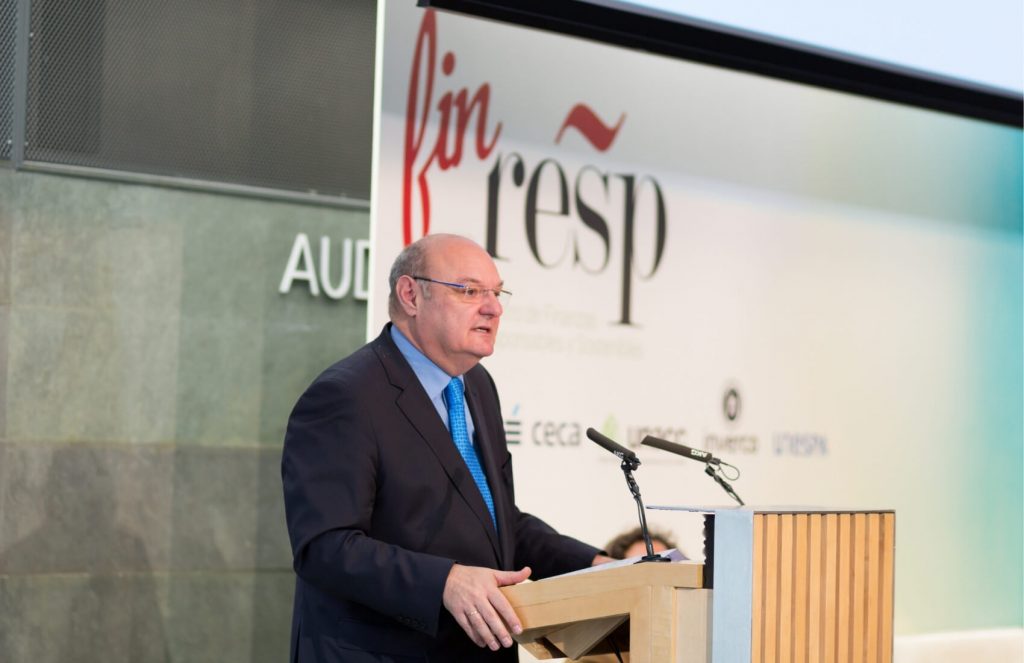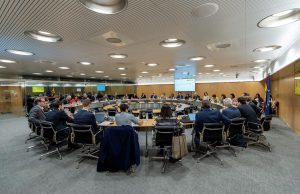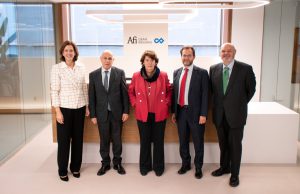Good morning and thank you all for attending.
Today we have come together to reflect on one of the major transformations taking place in the financial industry worldwide: the growing interconnectivity between sustainability, economic activity and financing. This is a structural change whose effects we are only beginning to witness.
This process of change has a global roadmap: the Sustainable Development Goals (SDGs), also known as the 2030 Agenda; and, with regard to the climate, the Paris Agreement (COP-21). The more or less global consensus around these goals is allowing us to accelerate the transformation towards sustainable coexistence models and a sound balance with the ecological and social environment.
The SDGs, especially those concerning climate change, represent a paradigm shift in the economic growth model. This transition will require an immense volume of investments:
– The United Nations Conference on Trade and Development estimates that investments of between $5 and $7 trillion a year are needed to achieve the global objectives.
– According to calculations made by the European Commission, the EU has to address an annual investment deficit of almost €180 billion until 2030 to achieve the goals related to climate and energy. In view of the European economy's goal of decarbonisation by 2050, impact studies estimate that an average annual investment of €1.33 to €1.42 trillion will be needed from 2031 until 2050.
– On the domestic front, the National Integrated Energy and Climate Plan estimates that almost €250 billion will be needed for the decade that just began, or around 1.5% of GDP.
These figures perfectly illustrate the need for effective cooperation between the public and private sectors to ensure the proper channelling of capital flows towards the investments necessary for achieving sustainability goals. This is where the financial sector comes into play, serving as the circulatory system of the business ecosystem.
The financial sector must operate from at least three perspectives:
– Firstly, financing. The banking sector, represented here by AEB, UNACC and CECA, is responsible for financing investments linked to achieving the SDGs and must undertake the additional challenge of measuring social and environmental risks. In Spain, this sector's commitment to sustainability became most evident when more than 95% of Spanish companies signed the Collective Agreement on Climate Change at COP25.
– Secondly, insurance. Insurance companies are key to tackling the physical risks brought on by climate change. UNESPA, as an association in the insurance sector, has distributed the United Nations Principles for Sustainable Insurance to its member entities so that these can integrate environmental, social and governance issues (ESG) into the decision-making process.
– Thirdly, asset management. The collective investment institutions and pension funds sector, grouped under the INVERCO association, are key to channelling funds towards a more sustainable and decarbonised economy. They became pioneers when, in 2014, they published the newsletter 'Application of Environmental, Social and Corporate Governance Criteria in the Investment Policy of CIIs'.
In this context, FINRESP emerges as the result of collective reflection throughout the entire financial sector, in its multiple manifestations. This is a milestone, and it is worth highlighting here today that these five institutions (AEB, CECA, INVERCO, UNACC and UNESPA) have joined together in a common project on sustainable finance.
FINRESP aims to contribute to economic and financial activity that is more sustainable and responsible by creating a meeting point where interest groups in the financial services industry can debate, raise awareness and experiment. In particular, FINRESP aims to become a leading centre in the link between sustainability and the productive sector, especially among our country's small and medium-sized companies.
This vision is embodied in the four strategic objectives that will guide FINRESP's activity in the immediate future:
– Increase the awareness of economic actors and Spanish society of the challenges and opportunities brought on by the 2030 Agenda.
– Improve the skills and abilities of economic actors in the fulfilment of this Agenda, primarily among SMEs.
– Support the identification of financial solutions designed to be good practices.
– Promote innovative formulas that forge a link between sustainability and financing.
A fifth aspect that embodies FINRESP is its international projection, as evidenced by our recent accession to the Financial Centres for Sustainability forum, promoted by the United Nations.
To achieve these goals, we have created a roadmap of joint actions that will help accelerate the transition to a sustainable and responsible economy. This roadmap, unearthed in an institutional declaration published by FINRESP on the occasion of COP25 in Madrid, includes the following commitments:
– Lead and promote sectoral actions aimed at contributing to the implementation of the global climate agreement established at the Paris Conference (COP21) and to the achievement of those Sustainable Development Goals with the greatest impact on financial activity.
– Initiate dissemination actions regarding sustainable finance and climate change through seminars, debates, reflections and practical proposals.
– Collaborate actively with public authorities in shaping and implementing an effective regulatory framework in an effort to achieve goals in the fight against climate change.
– Promote the adherence of entities in the financial sector to the sustainable principles and standards created by the United Nations, which encourage integrating environmental, social and governance issues into the decision-making process. These entail raising awareness among customers and suppliers in matters concerning sustainability and committing to regular public dissemination and transparency of the progress made in the application of these principles.
– Prepare an annual report on the progress of sustainable finance in Spain.
It is important that we take full account of the scale of the challenge that awaits us as a sector. Over the past two years we have taken a significant stride as an industry: we have become aware of and assumed the role that we have to play in this global effort. But now we have to get down to work. We are going to face major difficulties; yet I have no doubt that we will overcome them together, as we have always done.
The authorities have set a very demanding agenda. The Von der Leyen Commission has launched its Green Deal, which is making the European Union the leading international body in sustainable finance legislation. The Union is clearly making rapid progress in regulating key aspects for the development of sustainable finance, such as transparency, identifying non-financial risks, increasing disclosure requirements, determining standards and establishing the necessary taxonomy for defining the concept of 'sustainable investment'.
In this context, it is very important to highlight the increasing involvement of the European Supervisory Authorities, which have already opened the debate on the link between sustainability and prudent regulations. Identifying the types of climate risks, their modelling and their treatment for the purposes of capital consumption are issues that will take centre stage over the coming months.
We have begun 2020, a decade that the Secretary General of the United Nations (Antonio Guterres) has dubbed 'The Decade of Action'. This action is conditional upon the needs of customers in an increasingly digitalised and unstable environment whose vast regulatory challenges are driving the sector towards a more open and competitive model. And it is precisely this environment that has to spur us to be at the forefront of sustainable finance.
On behalf of the five associations promoting FINRESP, I thank you all for your attendance today at an event that I hope we will look back on as a turning point in the trajectory of a great project.
Next we will hear from one of the most knowledgeable people in our country on sustainability and climate change, Valvanera Ulargui. She is currently the director of the Spanish Climate Change Office, an institution that falls within the Ministry of Ecological Transition and Demographic Challenge. Likewise, she has advised leading institutions and bodies, such as the European Commission and ICEX, in sessions at the highest level in the fight against climate change, including those that laid the foundations for the Kyoto Protocol.
Valvanera, I would like to thank you for being here today at the event's closing. You have the floor.
Thank you very much.













